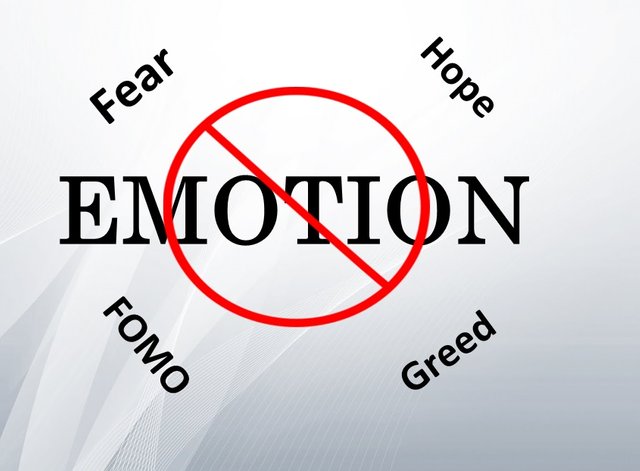
Whether you are a long-term investor or a trader learning to control your emotions can be one of the hardest things you will ever master. I have been involved in both the stock markets (10 years) and crypto markets (1.5 years) as both a long-term investor as well as a trader (day trading and swing trading). I have to say that without a doubt the single hardest lesson I have struggled with is learning to control my emotions both before and after entering a trade or investment. I have definitely made huge progress over the years but even now I am still prone to make a costly mistake from time to time due to my emotions. When I speak about emotions I am talking about mainly hope and fear but I think I would also add greed into the mix as well, letting any of these control your actions can be very costly. For me, fear has caused me to exit positions too early leaving a lot of money on the table and hope has caused me to stay in obvious bad investments or trades way too long hoping they will turn around.
In my opinion being a long-term investor is less stressful than being a trader, a long-term investor has the advantage of time on their side. But having said that, the long-term investor can still make mistakes due to emotions. A long-term investor needs to believe in the investment and not let emotions (fear, greed or hope) cause them to make expensive mistakes. For the most part, I would say that as long as the fundamental reason for the investment hasn't changed they should remain invested. Before going too much further I must say that when I say they "should remain invested" I am not suggesting there will never come a time when they should exit the investment. Even the long-term investor should have a clearly defined exit price for when an investment really goes against them. Probably the most common problem that emotions cause for the long-term investor is to cause them to jump in and out of investments too soon without giving them time to work.
For a trader, everything is magnified due to the shortened time frame they are dealing with. A day trader puts on trades that sometimes only last minutes so they need the trade to go in their favor very fast. This can cause extreme emotional swings from fear to hope. The best way I have found to deal with it is to have a clear plan in place before I enter a trade. The plan will include three things, I call them the pillars of my plan, my entry price, my stop loss (how much I am willing to lose on the trade), and a target price where I will exit the trade or begin to scale out of the trade. Most trades I enter are after the market has been open for at least 10 to 15 minutes, which gives me plenty of time to formulate the plan. I have entered some trades sooner where my plan was developed using the pre-market price action.
In my opinion, before a trader enters a trade they must have already clearly defined those three things (entry, target, stop loss). By creating a plan ahead of time it will help reduce emotional trading but it cannot eliminate it altogether. It will take a lot of time and experience to really gain some kind of control over your emotions. Ideally, when you trade you want to be totally free from emotion, as humans though that is very difficult to do. Another way to reduce emotion, especially for new traders is to reduce the amount of money you are risking. If you find yourself getting stressed after you enter a trade, most likely you are risking too much money.
I need to stress here that of the three "pillars" in my opinion the stop loss is the most important. I say this because I believe that risk mitigation or capital preservation, however, you want to say it is the most important job of a trader. A trader is only able to trade as long as their capital lasts if you blow up your account you are done, at least until you re-fund it. So to me, you should always set a stop loss, either mental or actual and always stick to it if your stop loss is hit, get out of the trade, you were wrong. That is another thing that can cause emotional stress, admitting when you are wrong about a trade, losses are a normal part of trading. You have to get to a place where you can except your losses without getting emotional as well as except your wins without getting too emotional.
I could go on and on but this is already longer than I thought it would be.
So, until the next blog post. Take care!
BigskyCrypto
Questions or comments? Email me at [email protected]
Also if you get a chance check out the BigskyCrypto store: https://bigskycrypto.store